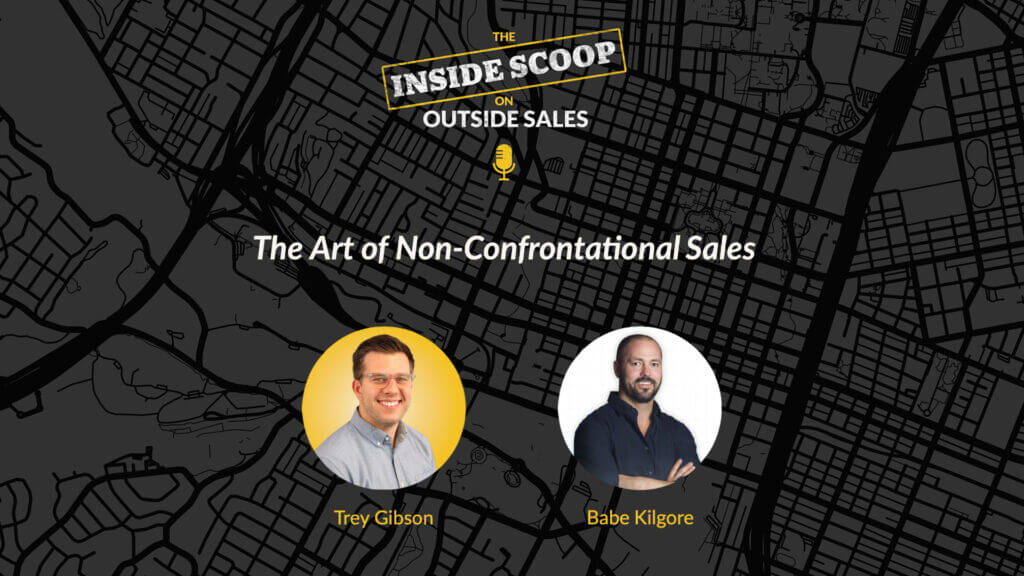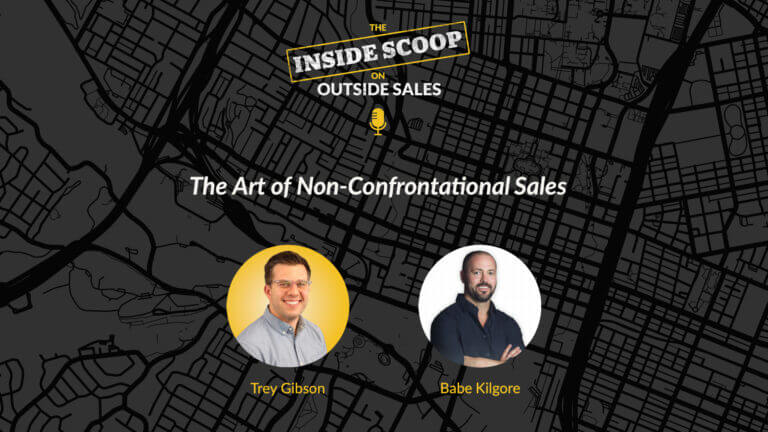Listen to the episode on Spotify.

________________________________________
The Art of Non-Confrontational Sales With Babe Kilgore
Babe Kilgore has spent his career mastering the psychology of direct sales and building sales companies. He has personally trained over 20,000 direct sales representatives through his sales and recruiting training mastery programs. Babe has taken multiple sales teams to the top in various industries. He received his bachelor’s from BYU. Still, his formal education came from knocking on tens of thousands of doors, selling products door to door, recruiting thousands of dynamic individuals, and teaching them the art of sales. Babe is highly respected for his integrity and ethics in direct sales and lives by the motto that sales techniques are skills. Therefore, anyone can learn to sell and even master it. He started his own company Nerd Power, a successful solar company, while also publishing a book called, Non-Confrontational Sales: A Modern Sales Guide To Rapidly Improving In-Home Sales. You can find his book for purchase across the web as well as on Amazon.
________________________________________
Find him Online:
Web: http://babekilgore.com
LinkedIn: https://www.linkedin.com/in/babe-kilgore-4123506/
________________________________________
Episode Highlight
Finding the Silver Lining: Turning Challenges into Opportunities:
The concept of non-confrontational sales is about removing barriers and creating high levels of engagement in sales interactions. This is achieved through proper communication, which involves mastering three major communication types: verbal, nonverbal, and meta-verbal communication. Verbal communication is about choosing the right words that produce certain chemical reactions in someone’s brain. It’s important to use pull words instead of push words and be intentional with your word choice.
When persuading potential customers, pushy language can often be counterproductive. Take, for example, the solar industry. Instead of forcing a sale by saying “We need to get you installed ASAP so you can start saving money,” more effective approach would be to say “Let’s see if we can fit you into our schedule, we’ve been busy with appointments but we have an opening tomorrow and the next day.”
By using words that build social proof and herd theory, you can create a pull effect that draws in the customer. It’s crucial to be intentional with your language and to have awareness of how it’s received by your audience. You can’t simply rely on a script and assume it doesn’t make a difference. Your words could decide between a sale and a lost opportunity.
To achieve good verbal communication, it’s necessary to practice and rehearse, develop a script, and role-play. The main takeaway is that communication is key to creating successful sales interactions.
Trey Gibson: So, how did you come up with the concept of non-confrontational sales? Like, you know, I also have a direct sales background, and when people think of direct or in-home sales, the last thing that comes to mind is non-confrontational. Right? As a matter of fact, like some of the training I went through early on, it’s about, you know, being confrontational. So it seems like a new or interesting way of looking at it. So how did you come up with this concept?
Babe Kilgore: Yeah, great question. So, I got really interested in how to persuade people to buy things while working in door-to-door sales. I found that many people were uninterested and reacted negatively because of bad experiences with salespeople. I wanted to find a non-confrontational way to sell products and create higher levels of engagement. I learned about sales psychology and how certain words and ways of speaking could produce certain chemical reactions in the brain. I used my background in science to understand how this works. Overall, I wanted to create a catalyst for conversation and make sales a positive, engaging experience for customers.
Trey Gibson: Let’s talk about the main principles, like the different communication methods discussed in the book. Can you elaborate on that?
Babe Kilgore: Yeah. Communication is all about engagement, which has become more important due to the abundance of information and social media. Using proper communication to break down barriers and overcome problems is crucial. To excel at engagement, you must master three types of communication: verbal communication, choosing the right words for your presentation, and discussion. Certain words can trigger chemical reactions, so choosing your words carefully is essential.
________________________________________
Episode Highlight
Self-Aware Closing:
By adopting a more scientific approach to your senses in sales, you can elevate the art of selling. Observe how your customers respond to certain cues and use them to your advantage. Take a personalized yet strategic approach to your sales pitch, and commit it to memory for greater success in closing deals.
Babe Kilgore: You have to sound authentic. You have to know the script to focus on what you’re doing. At the same time, focus on your speech, non-verbal communication, intonation, speed, volume, annunciation, singular word annunciation, stress level, and pausing. If you can master those, you see these reps that go out, and they’ll say they’re doing 3, 4, or even 5x what a typical rep does. It’s because they’ve mastered engagement, and again, the words having it up here and ingrained and memorized are critical so that you can focus on that feeling. And you’d be shocked, man, the simplest stuff.
I’ll give you a simple example. Suppose you memorized a different way to respond to a friend and had a buddy. In that case, you haven’t seen them in 10 years, and he calls you and says, hey man, I just moved back into town. How have you been? What does everybody say?
Good man. How are you? What if you simply retrained your response and said, I’ve been good, man, just really tired. I’ve been working a ton lately. What is your response going to be? I can dictate your response.
Trey Gibson: Yeah, but I’m going to wanna come closer to you. I’m going to try to understand that. Understand why.
Babe Kilgore: Yeah, literally 100% of the time, they go, oh, what do you do for work?
And people are like, how do you generate leads and get recruits easily without feeling confrontational? If you master verbal communication and say it in a non-threatening way, you can dictate responses from people.
I don’t mean this to sound like some master manipulative plan that can control human beings. This doesn’t work 100% of the time, but I’m talking about people who can lead generation recruits 3, 4, 5, 10x results because they’re just aware of what they say.
________________________________________
Episode Highlight
The Importance of Meta-Verbal and Non-Verbal Communication in Professional Settings:
Meta-verbal communication, particularly the speed of speech, significantly impacts a person’s emotional response. Additionally, non-verbal communication, including body language, appearance, and eye contact, is crucial in communication effectiveness. Professionals must be aware of these factors and tailor their communication style appropriately.
Babe Kilgore: So the gesture has to match what’s coming out of your mouth and match the tones. And then you’ve got body language regarding posture, and appearance, and movement. Some people that sell high-end services don’t dress for success. If you’ve got a big tattoo on your forehead that says death, you know, that’s going to cause some issues. There are other things that people don’t pay attention to, like the way you dress. If you’re selling particular services, if you sold Harley Davidsons, you wouldn’t dress like you sell software to accounting firms.
Non-verbal also includes eye contact and some other categories. But the meat and potatoes of communication types is meta-verbal communication. It has the single greatest influence, chemically speaking, on someone’s emotional bank account. And that’s the speed.
The speed at which you speak, intonation, that’s, that sing-song part of your voice, volume, annunciation, singular word stress, and pausing. So let’s take the first one. Speed. When you go to knock on a door or go into a business for the guys that are B2C, and you go to talk to an owner, what happens? You get a little nervous. We all do. I’ve been doing it for 21 to 22 years, and I still do. And your heart speeds up. You release norepinephrine. Naturally, you start to speak faster than you’d normally speak, and that speed creates confusion and disengagement.
So if you were knocking on a door and you said in a fast tone, “I had a couple of questions for the people who lived here. Do you own the house by chance?” (In a fast pitch)
You push back. It’s like, who’s this guy? But if I change that, and what I counsel, and through studies and what it does chemically to the brain, speaking slightly slower than is natural instantly increases engagement. “So I had a couple of questions for the people who lived here. Do you own the house by chance?” And that tone, that severity, I can get, it is going to sound conceited. Out of 10 people that answer, I’ll get almost 10 to engage with me at the door.
Trey Gibson: I even found myself leaning in as you were doing that. I’m interested. It’s almost like I’m drawn to that. So I can see how it works for sure.
Babe Kilgore: Right, and then you couple that with intonation. So that sing-songy part of your voice for new salespeople is probably the most difficult to master, but it’s the most influential.
People don’t realize that intonation is the window to the world and how they view you for your confidence level. So if you were to take it, I’ll give you an example. If you were to take the President of the United States, let’s take Barack Obama as an example. It would be hard to deny that he’s a good speaker. And he’s been known for that. And you think about the number one attribute of a president’s confidence and how he speaks to the American people. Everything comes down to the end. Those huge tones dropping down is massive confidence. Massive, I mean.
________________________________________
Top Quotes
“These reps that shadow people, and they hear how it’s said, and they don’t realize the change they make, but the change they make, generally speaking, is body positioning and meta verbal tones with some structural change in verbal communication.” – Babe Kilgore
“There is no such thing as natural-born salespeople. It’s a skill you can acquire.” – Babe Kilgore
“If they understand how bad the problem is and how bad it would get if they don’t fix it, your offering instantly becomes more valuable regardless of price and regardless of benefit.” – Babe Kilgore
“Number one is to ask questions to fully understand the prospect’s current situation and to ensure the prospect fully understands their own situation and the pain associated to it.” – Babe Kilgore


